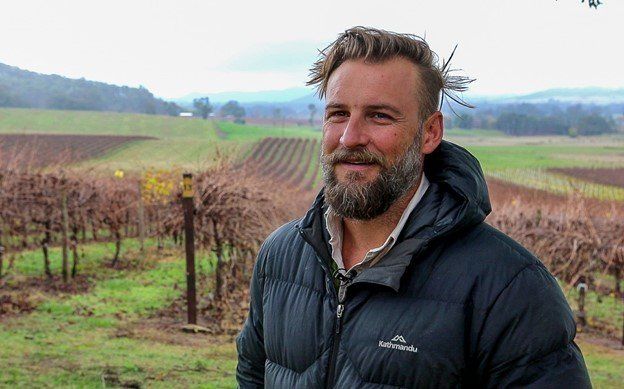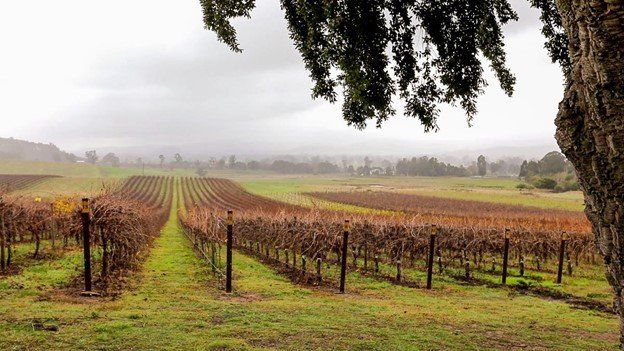1MG FlippingBooks
Isuzu and Cavedon Wines Reinventing Viniculture in Victoria's King Valley
27th October 2021
With acknowledgement to Isuzu Australia Limited and Arkajon Communications.

Nestled against the boundary of Victoria’s Alpine National Park, the picturesque King Valley is a feast for the senses. It’s highly regarded for its charming villages, world-class produce, vineyards, trout-filled rivers and gently undulating pasture country ideal for grazing or cropping.
Being Australia though—and at a high altitude—the idyllic region sees as mix of exceptionally warm and dry summers set against the backdrop of bone-chilling high-country winters.
In amongst this environment of extremes sits Cavedon Wines, a third-generation grape growing operation first planted by Dino Cavedon back in the late seventies. Now with the involvement of Dino’s daughter Pia and son-in-law Gabe, Cavedon has launched its own family label.
Cool sips: Cavedon Wines' Gabe O'Brien & Andrew Heslin from Water Dynamics talk grape growing & irrigation in the King Valley, VIC
Although not one for officialdom, Gabe has nonetheless assumed the role of Head Winemaker and explains the range of vines currently in the ground at Cavedon.
“The original plantings here were mostly noble varieties – Shiraz, Merlot, Cabernet. Since then, it has been progressively re-planted and grafted over to newer varieties.
“Now we’ve got a lot of Prosecco, Pinot Noir, Pinot Gris and some other alternate varieties that tend to fair a bit better in the cooler climates,” he said.
Dino originally partnered with the Department of Agriculture early on to facilitate the innovation of quality grape growing in King Valley, going on to formulate some of the pioneering viticultural methods used widely in the region today.
Three generations later, the Cavedon family are producing some of King Valley’s most sought-after fruit.
“We’ve got good temperature variation here in the valley, so that helps with the flavour of the fruit. We also have deep red volcanic clays that have come down from the Whitlands (a sub-alpine plateau to the north, 700-900 metres above sea level),” explained Gabe.
From an irrigation perspective, Cavedon simply needed more water flow over a larger section of the property.
“We started this process about two years ago by upgrading our pump to increase water volume in a more efficient way, and we’re now in the process of upgrading our sub mains and dripper tubes to supply more water to those grape varieties.”
Enter Andrew Heslin, the Yarrawonga Branch Manager at local water and irrigation experts, Water Dynamics.
A local to the region, Andrew is an expert on the King Valley’s climate, soil type and water catchment. He says it’s not uncommon for the summer months to pass with the King Valley receiving only five millimetres of rainfall.
“An efficient irrigation system is absolutely critical to grape growers in the area.”
“Crops dry out fast around here, with the evapotranspiration rate easily 50 millimetres a week, which is a huge amount.
For those not as well-versed in the science of water as Andrew, ‘evapotranspiration’ is the term used to describe the part of the water cycle which removes liquid water from an area with vegetation into the atmosphere by the process of both transpiration and evaporation.
While King Valley’s elevation is conducive for delightful European-style varietal wine, prevailing winds also render it one of the driest regions in Northeast Victoria.
Which is the very reason Gabe and Dino sought to upgrade their pumping infrastructure with the help of Andrew and the Water Dynamics team.
This meant they needed to pursue an engine capable of delivering water up to 60 meters in elevation, with fuel-efficiency a driving factor to keep costs under control.
Andrew and the team at Water Dynamics chose an Isuzu Power Solutions (IPS) 4JJ1TYBW01 power unit—from Isuzu’s Made-to-Stock Power Unit range—for the unrelenting task.
“We’ve used Isuzu engines in our broadacre irrigators on pivots, and we’ve installed thousands of those,” Andrew explained.
“We found them to be extremely reliable, and more importantly, the backup service provided by the technical team at IPS is incontestable.
“I’ve had conversations with the technical crew from Isuzu after-hours on a Sunday night and they’ve put actions in place to either support the customer over the phone or send service techs out to deal with the issue.
“They are always there 24/7 and that’s a great relief to both our team and our customers.”
Made-to-Stock units are manufactured in Japan and outfitted by IPS engineers in Australia with locally developed accessories to withstand the harshest of environments and applications.
The 4JJ1TYBW0 power unit, offering low fuel consumption and an output of 61kW / 81 hp @ 2,500 RPM, caught the eye of Water Dynamics, who wanted a perfect match for Cavedon Wines and the climate of the King Valley.
“With the demonstrated performance of what we’ve experienced here in the King Valley with that horsepower, the torque, the fuel efficiency and the unit being suited to the climate and application, we will continue to offer these engines in horticultural settings here,” said Andrew.
“We wouldn’t be happy selling any inferior products that would cause us headaches down the line—we want to sell a product that is one of the world’s best to satisfy our customers.
“I know I can count on Isuzu Power Solutions to provide the type of backup service we require, from filters to belts, to sending techs out, whatever we need,” Andrew concluded.
Gabe summarised, “For us, if we haven’t got good, efficient water supply, particularly in those heat waves of summer, it can be critical. It (irrigation) is very crucial to the success of the business – it’s a core part of it all.”


















